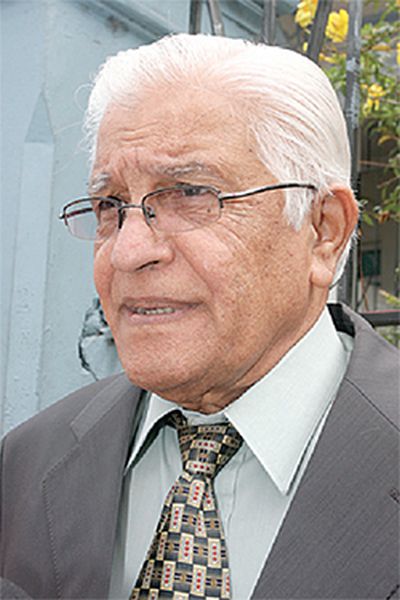(Trinidad Guardian) Minister of National Security Fitzgerald Hinds has confirmed that former prime minister Basdeo Panday will be given a State funeral.
Speaking yesterday at the Prison Service’s First Working Day Interfaith Service at the Universal of Church of the Kingdom of God, Broadway, Port-of-Spain, Hinds said the government reached out to Mr Panday’s relatives about the State funding his funeral, and the family has agreed to it.
“I join the honourable Prime Minister of Trinidad and Tobago Dr Rowley in paying respectful tribute to the life and the work and the contribution to Trinidad and Tobago of Basdeo Panday,” he said.
Minister Hinds explain-ed that Panday’s body must first be brought back into this country since he was abroad at the time of his death. He died at a hospital in Jacksonville, Florida on Monday where he had been seeking medical care.
“National Security has a very critical role to play in ensuring that the body returns—with the solemnity and the respect that it deserves—from abroad into Trinidad and Tobago, all the way through the period of mourning and it’s interment,” he said.
The National Security Minister added that a date for the funeral is yet to be announced. He confirmed that will be left up to Panday’s relatives to determine.
Panday, who served as T&T’s fifth prime minister from 1995 to 2001, was the first person of Indian descent and the first Hindu to hold that office.
He was first elected to Parliament in 1976 and served as Leader of the Opposition five times between 1976 and 2010, in addition to being a founding member of the United Labour Front (ULF), the National Alliance for Reconstruction (NAR) and the United National Congress (UNC).
Panday was born on May 25, 1933, in St Julien Village, Princes Town, to Kissoondaye and Harry “Chote” Sookchand Panday.
He attended New Grant Government School, St Julien Presbyterian School and Presentation College, San Fernando.
He later worked as a sugarcane weigher, primary school teacher and at the San Fernando Magistrates’ Court where he took notes for several magistrates, including Noor Hassanali, who would go on to be President during Panday’s term as prime minister.
In 1957, Panday left for the United Kingdom to further his education. He obtained a diploma in drama from the London School of Dramatic Art in 1960 and a degree in law in 1962 from Inns of Court School of Law and was called to the bar at Lincoln’s Inn.
He also received a Bachelor of Science in Economics from the Uni-versity of London as an external student in 1965 and was awarded a Com-monwealth scholarship to go to the Delhi School of Economics in India to pursue a post-graduate degree in economics and political science. However, he turned down the offer and returned to T&T to practice law.
Panday’s political career began in 1965, when he joined the Workers’ and Farmers’ Party and made an unsuccessful run for Parliament
Together with fellow union leaders George Weekes and Raffique Shah, he founded the United Labour Front in 1975 and won the Couva North seat the following year, becoming an MP and official opposition leader.
The next year, the party split into two factions and Panday was ousted as party leader in favour of Shah. He was reinstated in 1978 after Winston Nanan, who previously supported Shah, defected to Panday and Shah resigned
In 1980, Panday co-founded the T&T National Alliance with ANR Robinson of the Demo-cratic Action Congress and Lloyd Best of the Tapia House Group. In 1984, it became the National Alliance for Reconstruc-tion (NAR) and in 1985 merged with the Organi-sation for National Recon-struction.
The NAR won a decisive victory in 1986 and Panday was named Minis-ter of External Affairs and International Trade. How-ever, the party soon fractured and Robinson reshuffled his cabinet, relegating Panday to reduced ministerial responsibilities.
Panday, Kelvin Ramnath and Trevor Sudama were expelled from the party on February 8, 1988, and they went on to found the Caucus for Love, Unity and Brotherhood (CLUB ‘88), which later become the United National Congress (UNC) on April 30, 1989.
The 1995 general election was a defining moment in Panday’s career, ending with the People’s National Movement and UNC holding 17 seats each, and the NAR holding two. The UNC and NAR entered a coalition, bringing the UNC into power and making Panday prime minister.
The 2001 general election resulted in an 18–18 tie between the UNC and PNM, sparking a constitutional crisis over who should form government. When then President Arthur NR Robinson appointed PNM leader Patrick Manning, Panday refused to accept the position of Leader of the Opposition in protest.
Parliament was dissolved and new elections were called in 2002 and this time the PNM won.
On January 24, 2010, Panday lost his bid to be re-elected UNC political leader at the hands of Kamla Persad-Bissessar. On February 25, 2010, President George Maxwell Richards revoked his appointment as Opposition Leader
He did not participate in the general elections of May 24, 2010, and his term as a Member of Parliament ended.
Panday is survived by his wife Oma and daughters Niala, Mickela, Nicola, and Vastala.






